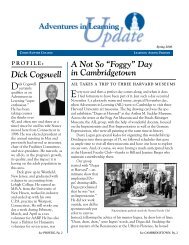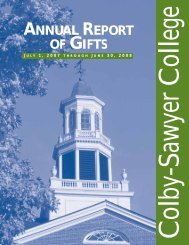Fall 2012 Issue - Colby-Sawyer College
Fall 2012 Issue - Colby-Sawyer College
Fall 2012 Issue - Colby-Sawyer College
You also want an ePaper? Increase the reach of your titles
YUMPU automatically turns print PDFs into web optimized ePapers that Google loves.
Zombies.” HvZ, as it is<br />
affectionately called by<br />
those who take part, is<br />
essentially a week long<br />
game of tag in which an<br />
ever-growing number<br />
of “zombies” attempt to<br />
tag (and infect) an ever-<br />
dwindling number of<br />
“human” survivors.<br />
As the hordes of zombies<br />
grow and the ranks of<br />
humans diminish, students<br />
become ever more<br />
creative and vigilant in<br />
their efforts to survive the<br />
week. As I watched this<br />
student leave my office to<br />
begin his perilous trek<br />
across campus, I wondered<br />
if I had stumbled onto<br />
a theme for a new course.<br />
I began digging into<br />
zombie history.<br />
Much to my surprise and<br />
delight, my investigation<br />
into the many deaths and<br />
rebirths of the zombie<br />
uncovered a rich layer in<br />
20th-century American<br />
history. From its introduction<br />
in the early years of<br />
the Great Depression to its<br />
current explosion in print,<br />
television and film, the<br />
zombie has risen from the<br />
grave as a symbol of the<br />
nation’s deepest fears,<br />
whether of the masses of<br />
desperate unemployed<br />
workers in the 1930s or of<br />
the fanatical 21st-century<br />
terrorist.<br />
I fell in love with the<br />
seemingly unlovable<br />
zombie and knew students<br />
would, too. After all, the<br />
zombie is the perfect<br />
protagonist for a liberal<br />
education class because<br />
it crashes through<br />
disciplinary boundaries.<br />
Zombies have been summoned<br />
by both economists<br />
who disparage the<br />
financial institutions kept<br />
alive by state interventions<br />
and philosophers who<br />
construct “philosophical<br />
zombies” to examine<br />
the nature of human<br />
consciousness.<br />
By the fall semester of<br />
2011, I had harnessed the<br />
zombie’s awesome power<br />
and found myself discussing<br />
the parallels between<br />
first classes and first dates<br />
with the 20 students<br />
enrolled in my first-year<br />
Pathway seminar, lovingly<br />
titled “ZOMBIES!!!”<br />
Many of these students<br />
confessed that they enrolled<br />
in the class simply<br />
because they love zombie<br />
movies, yet the energy<br />
of these students revealed<br />
the incredible power of<br />
student engagement. Once<br />
“The zombie is the perfect<br />
protagonist for a liberal education<br />
class because it crashes through<br />
disciplinary boundaries.”<br />
shown the complexity<br />
buried within this undead<br />
creature, they began<br />
making connections and<br />
moving in directions I did<br />
not anticipate. The discovery,<br />
construction and<br />
execution of this course<br />
has been, by far, the most<br />
satisfying “academic first<br />
date” of my teaching<br />
career.<br />
Eric Boyer, who joined the<br />
college in 2008, teaches<br />
classes in government,<br />
history and political science.<br />
He was awarded the<br />
Outstanding Teaching in<br />
Postsecondary Education<br />
Award by the New<br />
Hampshire <strong>College</strong> and<br />
University Council in <strong>2012</strong><br />
and <strong>Colby</strong>-<strong>Sawyer</strong>’s 2011<br />
Jack Jensen Award for<br />
Excellence in Teaching.<br />
<strong>Fall</strong> <strong>2012</strong><br />
15









